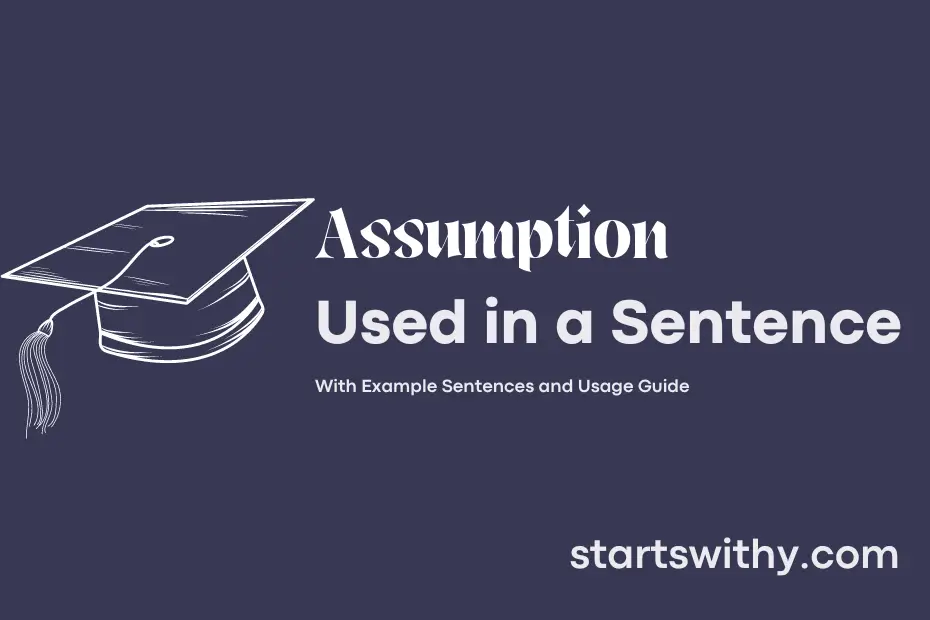Have you ever stopped to consider how much our daily interactions and decisions are shaped by assumptions? An assumption is a belief or idea that is taken for granted without proof or verification. It’s a common shortcut our brains often take to make sense of the world around us.
Whether it’s assuming someone’s intentions, making predictions about the future, or jumping to conclusions about a situation, we frequently rely on assumptions to navigate our daily lives. Recognizing our assumptions and examining them more closely can lead to better understanding, improved communication, and more informed decision-making.
7 Examples Of Assumption Used In a Sentence For Kids
1.Assumption means guessing something without knowing for sure.
2. We should ask questions to make sure our assumptions are correct.
3. It is important to listen carefully to avoid making wrong assumptions.
4. Sometimes our assumptions can be different from what is actually true.
5. We should always check our assumptions before making a decision.
6. Making a wrong assumption can lead to misunderstandings.
7. It is good to ask for help if we are not sure about our assumptions.
14 Sentences with Assumption Examples
- Assumption is the mother of all failures; always double-check your sources before citing them in your research paper.
- Many students make the assumption that all the information they need is available online, but sometimes the library is a better resource.
- It’s a common assumption that all professors will accept late assignments, but it’s always best to clarify their policy beforehand.
- Don’t make the assumption that everyone in your group project will do their fair share of work; communicate openly and set clear expectations from the start.
- It’s a risky assumption to think that you can cram for exams the night before and still do well; consistent studying is key to success in college.
- Some students make the assumption that attending every class isn’t necessary, but each lecture offers valuable information that may not be available in textbooks.
- Making the assumption that all professors grade on a curve can be misleading; some may have different grading systems, so it’s important to understand their criteria.
- It’s a dangerous assumption to think that plagiarism will go unnoticed; always cite your sources properly to avoid academic dishonesty.
- Many students make the assumption that internships are only for upperclassmen, but there are opportunities available for students at every academic level.
- Don’t make the assumption that your schedule will always go according to plan; unexpected events may arise, so be prepared for changes.
- It’s an unfair assumption to think that all students have the same access to resources; be mindful of your classmates’ individual circumstances.
- Making the assumption that all assignments will be easy can lead to complacency; challenge yourself to grow and learn throughout your college career.
- It’s a common assumption that all college students know how to manage their finances, but it’s important to seek guidance and support if needed.
- Don’t make the assumption that your career path is set in stone; explore different opportunities and keep an open mind about your future.
How To Use Assumption in Sentences?
Assumptions are statements or beliefs that are accepted as true without any proof or evidence. Assumption is often used in daily conversations, writing, and critical thinking. Here is a guide on how to use Assumption in a sentence:
-
Identify the context: Before using the word Assumption, make sure you understand the situation and the information you are basing it on.
-
Formulate the sentence: Construct a sentence where you want to convey something believed to be true without proof. For example, “John’s assumption that Susan would be late turned out to be incorrect.”
-
Use the word appropriately: Make sure the word Assumption fits well in the sentence and conveys the intended meaning accurately.
-
Check for clarity: Review your sentence to ensure that it is clear and understandable to the reader. Avoid using jargon or overly complex language.
-
Practice makes perfect: To become more comfortable using the word Assumption, try incorporating it into your conversations and writing regularly.
By following these steps, you can effectively use Assumption in a sentence to express beliefs or ideas without concrete evidence. Remember that it is essential to be mindful of your assumptions and be open to questioning them to ensure accurate communication.
Conclusion
In summary, sentences with assumptions are characterized by statements made without concrete evidence or proof to support them. These sentences often rely on personal beliefs, opinions, or biases rather than verifiable facts. When crafting sentences with assumptions, it is important to be mindful of how these assumptions can shape the way information is perceived by others. It is crucial to differentiate between assumptions and facts to ensure accuracy and clarity in communication.
By being aware of the presence of assumptions in our sentences, we can strive to promote more objective and informed discourse. Challenging assumptions and seeking evidence to substantiate claims can lead to more meaningful and respectful exchanges, fostering better understanding and collaboration among individuals. In conclusion, being conscious of assumptions in sentences is fundamental to effective communication and critical thinking.



